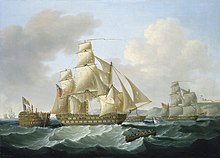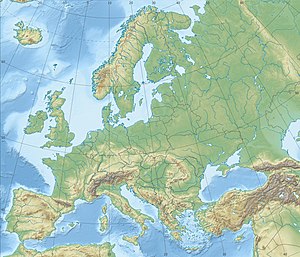
Back Batalla del Cabo Ortegal Spanish Bataille du cap Ortegal French Ortegal-foki csata Hungarian Battaglia di Cabo Ortegal Italian オルテガル岬の海戦 Japanese ორტეგალის კონცხის ბრძოლა Georgian Bătălia de la Capul Ortegal Romanian Сражение у мыса Ортегаль Russian Битва біля мису Ортегаль (1805) Ukrainian
| Battle of Cape Ortegal | |||||||
|---|---|---|---|---|---|---|---|
| Part of the Trafalgar campaign of the War of the Third Coalition | |||||||
 Bringing Home the Prizes, Francis Sartorius | |||||||
| |||||||
| Belligerents | |||||||
|
|
| ||||||
| Commanders and leaders | |||||||
|
|
| ||||||
| Strength | |||||||
|
4 ships of the line 4 frigates | 4 ships of the line | ||||||
| Casualties and losses | |||||||
| 135 killed or wounded[1][2] |
730 killed or wounded 4 ships of the line captured[1][2] | ||||||
Location within Europe | |||||||
The Battle of Cape Ortegal was the final action of the Trafalgar campaign, and was fought between a squadron of the Royal Navy and a remnant of the fleet that had been defeated earlier at the Battle of Trafalgar. It took place on 4 November 1805 off Cape Ortegal, in north-west Spain and saw Captain Sir Richard Strachan defeat and capture a French squadron under Rear-Admiral Pierre Dumanoir le Pelley. It is sometimes referred to as Strachan's Action.
Dumanoir had commanded the van of the line at Trafalgar, and had managed to escape the battle having suffered relatively little damage. He initially attempted to continue the fleet's mission and enter the Mediterranean, but fearful of encountering strong British forces, changed his mind and headed north to skirt round Spain and reach the French Atlantic ports. On his journey he encountered two British frigates and drove them off; shortly afterwards he encountered a single British frigate and gave chase to it. The frigate led Dumanoir within range of a British squadron under Strachan, who was patrolling the area in search of a different French squadron. Strachan immediately gave chase, while Dumanoir fled from Strachan's superior force. Strachan's squadron took time to form up, but he was able to use the frigates attached to it to harass and slow the French, until his larger ships of the line could catch up.
There then followed several hours of fierce fighting, before Strachan was able to outmanoeuvre his opponent and double his line with frigates and ships of the line. The French ships were then overwhelmed and forced to surrender. All four ships were taken back to Britain as prizes and commissioned into the Navy. Strachan and his men were handsomely rewarded by a public who viewed the successful outcome as completing Nelson's victory at Trafalgar.
